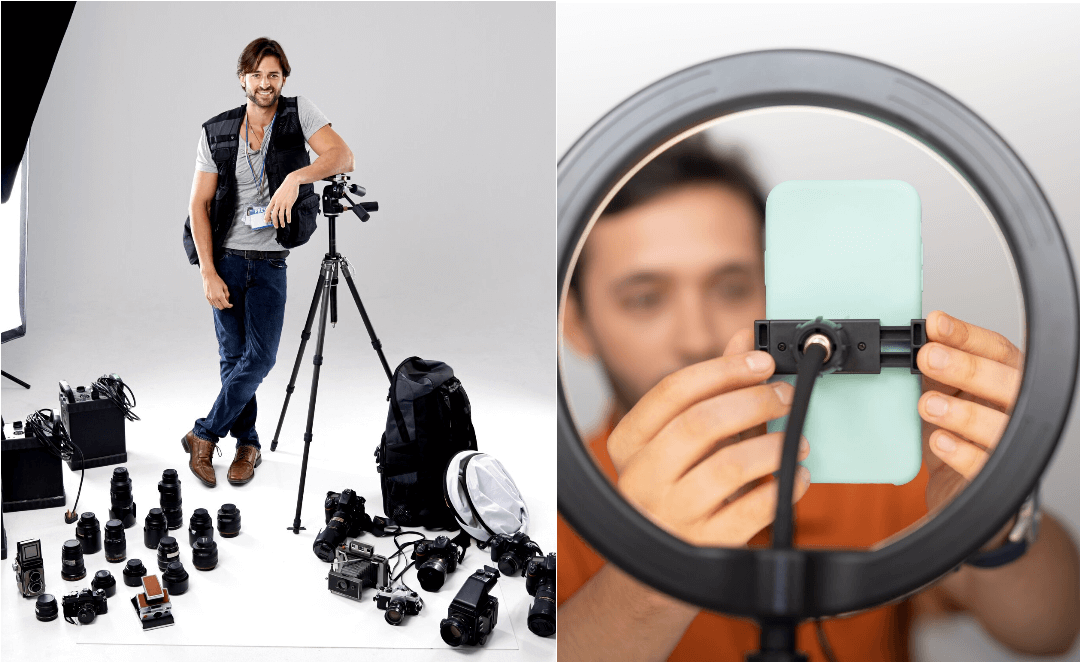The Issue
In today's digital age, having a website is essential for any business that wants to succeed. However, with the rise of no-code drag-and-drop page builders, virtually anyone with a laptop can claim to be a web designer. This means that it's becoming increasingly difficult to differentiate between amateurs and professionals in the field.
In this article, we'll explore six ways to spot a professional web designer from an amateur. By evaluating these factors, you can ensure that you're working with a web designer who has the expertise, experience, and tools necessary to create a website that will help your business succeed.
Look Beyond Previous Sites
One of the most common mistakes that people make when evaluating web designers is to focus solely on their previous work. While it's important to look at a designer's portfolio and the websites they've built in the past, there is so much more that goes into professional web design than just the final product.
Make sure to also consider factors such as the designer's process, toolset, and expertise. Ask questions about how they approach different design challenges, what tools they use to build their sites, and how they stay up-to-date with the latest web design trends and techniques.
Professional web designers understand that there is so much more to web design than just the final product. Amateurs, on the other hand, may focus solely on creating a visually appealing website and not pay enough attention to the functionality and user experience.
When evaluating a web designer, be sure to ask about their process and how they approach different design challenges. Amateurs may not have a clear process and may struggle to explain their design choices.
Check for a Professional Contract
A professional web designer should have a contract that outlines the scope of work, timelines, payment terms, and other important details. This contract should include an explanation of the product or solution, a project overview, an outlining of the process, termination clauses, and clear roles and responsibilities of all involved parties.
Professional web designers understand the importance of having a clear contract in place. They know that a contract helps protect both parties and ensures that everyone is on the same page. Amateurs may not have a contract at all, or they may have a poorly written one that leaves room for misunderstandings and disputes.
When working with a web designer, always make sure to have a professional contract in place. This will help ensure that everyone understands their roles and responsibilities and that there are no surprises down the line.
Evaluate the Toolset
The tools that a web designer uses can have a significant impact on the quality of the final product. While drag-and-drop tools like Wix, Squarespace, and Elementor have their place, they are designed for non-professionals. Professionals generally use tools such as Webflow, Oxygen (for WordPress), and Brick (for WordPress) when building their sites.
These tools provide more flexibility and control over the design process, allowing designers to create more complex and customized websites. Professional web designers use professional-grade tools that allow them to create high-quality websites that are optimized for search and perform well across different devices and browsers.
Amateurs may rely on drag-and-drop tools that are easy to use but may not provide the level of customization and control necessary to create a truly unique and effective website.
When evaluating a web designer, ask about the tools they use and how they will help achieve your goals. Professional web designers should be able to explain the benefits of their toolset and how it will help create a website that meets your needs.
Consider the Designer's Tone
A professional web designer should be able to guide you in making informed decisions about your website. They should be able to explain their design choices and provide suggestions for how to achieve your goals. Additionally, they should be able to communicate in a way that is clear, respectful, and professional. Amateurs are usually more focused on creating a website that looks good but may not provide the level of guidance and support necessary to create a website that truly meets your business goals.
When evaluating a web designer, pay attention to their tone and communication skills. Do they listen to your needs and concerns? Do they explain things in a way that is easy to understand? Do they provide guidance and support throughout the design process?
Evaluate Their Focus
A professional web designer focuses on creating a website that will help your business succeed in the long term, not just building a one-time product. This means that they should be interested in understanding your business goals, target audience, unique value proposition, and how the website will help you stand out from your competitors.
Additionally, a professional web designer focuses on the outcome and impact the website will have on your business. Amateurs focus more on creating a website that looks good and is completed quickly, without thinking about the long-term impact it will have on your business.
When working with a web designer, be sure to discuss your long-term goals and how the website will help you achieve them. A professional web designer should be able to explain how their design choices will help you stand out from your competitors and achieve your business goals.
Check for Pricing Transparency
Professional web designers understand the importance of building long-term relationships with their clients. They know that a successful website is an ongoing investment, and they offer pricing models that support this. Amateurs may offer a one-time fee that does not include ongoing maintenance or support, which can lead to additional costs down the line.
When working with a web designer, make sure to discuss the pricing structure and what is included in the fee. A professional web designer will be transparent about their pricing and should offer ongoing maintenance and support to ensure that your website continues to perform well over time.
In conclusion, by evaluating these six factors, you can ensure that you're working with a professional web designer who will help your business succeed. By doing your due diligence upfront, you'll be able to avoid the pitfalls of working with amateurs and get a website that meets your needs and exceeds your expectations.



